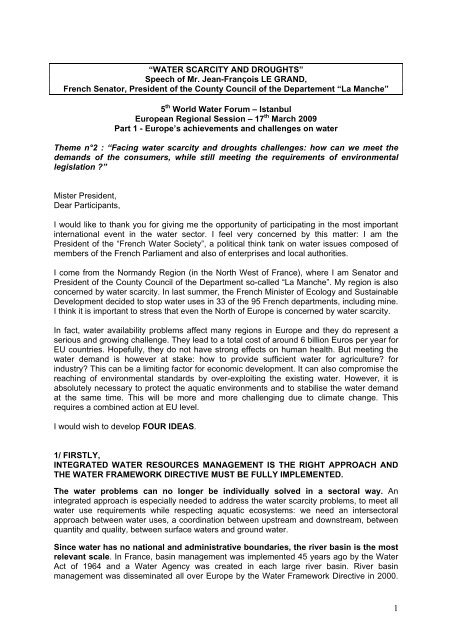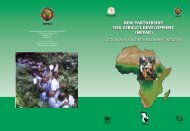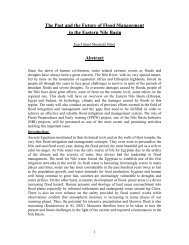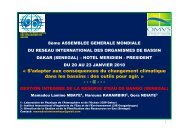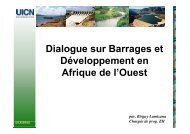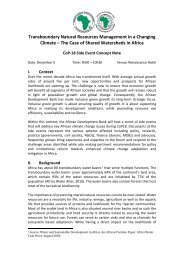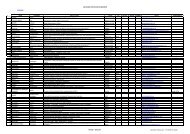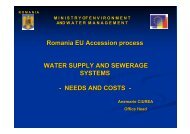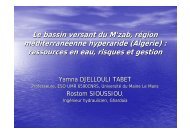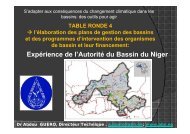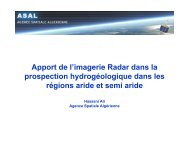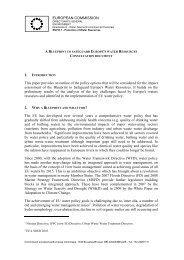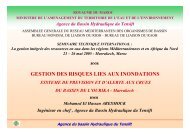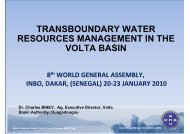âWATER SCARCITY AND DROUGHTSâ Speech of Mr. Jean ... - INBO
âWATER SCARCITY AND DROUGHTSâ Speech of Mr. Jean ... - INBO
âWATER SCARCITY AND DROUGHTSâ Speech of Mr. Jean ... - INBO
Create successful ePaper yourself
Turn your PDF publications into a flip-book with our unique Google optimized e-Paper software.
“WATER <strong>SCARCITY</strong> <strong>AND</strong> DROUGHTS”<br />
<strong>Speech</strong> <strong>of</strong> <strong>Mr</strong>. <strong>Jean</strong>-François LE GR<strong>AND</strong>,<br />
French Senator, President <strong>of</strong> the County Council <strong>of</strong> the Departement “La Manche”<br />
5 th World Water Forum – Istanbul<br />
European Regional Session – 17 th March 2009<br />
Part 1 - Europe’s achievements and challenges on water<br />
Theme n°2 : “Facing water scarcity and droughts challenges: how can we meet the<br />
demands <strong>of</strong> the consumers, while still meeting the requirements <strong>of</strong> environmental<br />
legislation ?”<br />
Mister President,<br />
Dear Participants,<br />
I would like to thank you for giving me the opportunity <strong>of</strong> participating in the most important<br />
international event in the water sector. I feel very concerned by this matter: I am the<br />
President <strong>of</strong> the “French Water Society”, a political think tank on water issues composed <strong>of</strong><br />
members <strong>of</strong> the French Parliament and also <strong>of</strong> enterprises and local authorities.<br />
I come from the Normandy Region (in the North West <strong>of</strong> France), where I am Senator and<br />
President <strong>of</strong> the County Council <strong>of</strong> the Department so-called “La Manche”. My region is also<br />
concerned by water scarcity. In last summer, the French Minister <strong>of</strong> Ecology and Sustainable<br />
Development decided to stop water uses in 33 <strong>of</strong> the 95 French departments, including mine.<br />
I think it is important to stress that even the North <strong>of</strong> Europe is concerned by water scarcity.<br />
In fact, water availability problems affect many regions in Europe and they do represent a<br />
serious and growing challenge. They lead to a total cost <strong>of</strong> around 6 billion Euros per year for<br />
EU countries. Hopefully, they do not have strong effects on human health. But meeting the<br />
water demand is however at stake: how to provide sufficient water for agriculture? for<br />
industry? This can be a limiting factor for economic development. It can also compromise the<br />
reaching <strong>of</strong> environmental standards by over-exploiting the existing water. However, it is<br />
absolutely necessary to protect the aquatic environments and to stabilise the water demand<br />
at the same time. This will be more and more challenging due to climate change. This<br />
requires a combined action at EU level.<br />
I would wish to develop FOUR IDEAS.<br />
1/ FIRSTLY,<br />
INTEGRATED WATER RESOURCES MANAGEMENT IS THE RIGHT APPROACH <strong>AND</strong><br />
THE WATER FRAMEWORK DIRECTIVE MUST BE FULLY IMPLEMENTED.<br />
The water problems can no longer be individually solved in a sectoral way. An<br />
integrated approach is especially needed to address the water scarcity problems, to meet all<br />
water use requirements while respecting aquatic ecosystems: we need an intersectoral<br />
approach between water uses, a coordination between upstream and downstream, between<br />
quantity and quality, between surface waters and ground water.<br />
Since water has no national and administrative boundaries, the river basin is the most<br />
relevant scale. In France, basin management was implemented 45 years ago by the Water<br />
Act <strong>of</strong> 1964 and a Water Agency was created in each large river basin. River basin<br />
management was disseminated all over Europe by the Water Framework Directive in 2000.<br />
1
More recently, the need for basin organizations was integrated by the United Nations into the<br />
Declaration <strong>of</strong> the Commission for Sustainable Development in May 2008.<br />
To address water scarcity, the Water Framework Directive (WFD) provides some tools: river<br />
basin management planning, programmes <strong>of</strong> measures, economic instruments, public<br />
participation, transboundary coordination. Particularly, the cost-recovery principle and the<br />
incentive pricing to be set up before 2010 can help to better control the water demand.<br />
That is why, in my mind, the full implementation <strong>of</strong> WFD is necessary to address water<br />
scarcity.<br />
2/ SECONDLY,<br />
THE ALLOCATION OF WATER RESOURCES BETWEEN USES MUST BE ORGANIZED<br />
<strong>AND</strong> WATER EFFICIENCY MUST BE STRONGLY REINFORCED.<br />
Providing water to the public should be the top priority.<br />
Other water use priorities should be defined through participative processes. For<br />
example, in France, in each river basin, the priorities are decided by the Basin Committee,<br />
gathering the representatives <strong>of</strong> the State, the local authorities and the different categories <strong>of</strong><br />
users. The priorities are then detailed at the local level by Local Water Commissions. For<br />
example, in the river basins experiencing frequent or permanent water shortage, the farmers<br />
are submitted to a compulsory allocation <strong>of</strong> water, each <strong>of</strong> them receiving a “water quota”.<br />
Water-saving measures should be reinforced. Priority should be given to the reduction <strong>of</strong><br />
the demand. Special attention should be paid to measures aiming to improve land-use<br />
planning and water-saving in agriculture. We have to make better use <strong>of</strong> the available water<br />
resources and avoid mobilizing supplementary resources. This is only when all water saving<br />
and water efficiency measures have been implemented, that additional water supply<br />
infrastructures should be set up and if the impacts on the environment are minimized.<br />
Financial incentives appear necessary. National water pricing policies should be more<br />
efficient, by setting the right price for water and introducing compulsory water metering<br />
programmes.<br />
Legal instruments are also necessary, reinforcing controls and taking measures <strong>of</strong><br />
restriction for water uses. For example, in France, the State representative in each<br />
department can decide to reduce or suppress some water uses. He can also ask the<br />
operators <strong>of</strong> dams to release water in the river to guarantee a minimal flow protecting aquatic<br />
life.<br />
To conclude on this point, we have to restore the balance between water <strong>of</strong>fer and<br />
demand ; we have to move from a policy <strong>of</strong> <strong>of</strong>fer to a policy <strong>of</strong> demand.<br />
3/ THIRD POINT,<br />
IT IS NECESSARY TO SOLVE THE SHORT-TERM PROBLEMS BUT ALSO TO ADOPT A<br />
LONG-TERM PLANNING<br />
Action cannot any more be done on a case-by-case basis but it must be planned in the<br />
long term by solving structural problems. Management Plans for water scarcity and<br />
droughts should be developed in order to pass from crisis management to risk management,<br />
to anticipate the consequences, to integrate prevention and adaptation measures.<br />
2
In France, after the high drought <strong>of</strong> the Summer 2003, the government decided to<br />
elaborate a national action plan. This water scarcity management plan gives priority to<br />
drinking water, is focused on the water allocation between uses and the shift from watersupply<br />
oriented policy to a water-demand oriented policy. The national plan is conducted by<br />
a National Committee, gathering the representatives <strong>of</strong> all stakeholders concerned. A<br />
specific committee meets regularly in each river basin.<br />
The challenge is to develop a long-term planning instead <strong>of</strong> a management by fits and<br />
starts.<br />
4/ LAST POINT,<br />
WE MUST REINFORCE OUR COOPERATION IN EUROPE<br />
The WFD defines useful tools. But it was necessary to go further. In July 2007, the European<br />
Commission published a Communication “"Addressing the challenge <strong>of</strong> water scarcity<br />
and droughts in the European Union". After this communication, a Working Group has<br />
been put in place within the European Common Implementation Strategy <strong>of</strong> the WFD. This<br />
Working Group is preparing guidelines for a future legislative instrument. Other actions are<br />
under preparation: Europe is working towards an early warning system and the definition <strong>of</strong><br />
common indicators to monitor both water scarcity and drought.<br />
To progress in this way, I would like to stress the added-value <strong>of</strong> better coordination.<br />
Upstream-downstream common cause should be increased especially in international<br />
basins: exchange <strong>of</strong> data, coordination <strong>of</strong> monitoring and warning systems, integration <strong>of</strong><br />
information systems, coordination <strong>of</strong> actions. Bilateral and international agreements<br />
should be signed. Transboundary cooperation is <strong>of</strong> high importance: to prevent socioeconomic<br />
and environmental impacts, it is essential that countries act together.<br />
To conclude this point, I want to say: water doesn’t belong to a country or another, but<br />
to a geographical reality. Water must be a factor <strong>of</strong> peace and not a factor <strong>of</strong> conflict!<br />
Conclusion<br />
As a conclusion, I would like to stress the need:<br />
- to adopt river basin management and fully implement the WFD;<br />
- to set priorities and allocate water between uses;<br />
- to improve water efficiency and save water before developing new resources;<br />
- to adopt a long-term planning;<br />
- to reinforce the European cooperation, especially for transboundary rivers and aquifers.<br />
Finally, as a French Parlementarian strongly involved in the water sector, I would like to give<br />
here my full support to the candidature <strong>of</strong> the City <strong>of</strong> Marseille for hosting the next World<br />
Water Forum. I hope you will consider, as I do, that this is a challenge for Europe.<br />
Thank you for your attention.<br />
3


